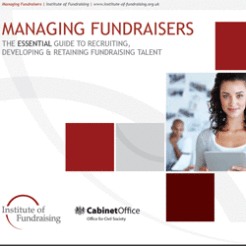The Institute of Fundraising has defended a guide it produced, partly funded by the Office of Civil Society, after it was reviewed as badly written and not useful.
In a blog titled ‘Don’t waste your time with Managing Fundraisers’ on the NCVO website, Richard Piper, previously head of strategy at the organisation but now chief executive of Roald Dahl's Marvellous Children’s Charity, was scathing about the Institute of Fundraising publication which aims to provide advice on how to manage fundraising staff.
Piper told readers they “shouldn’t bother” reading the Managing Fundraisers guide, which he criticised as “badly written” and not useful. He wrote: “It completely fails to address misunderstandings about fundraising. In fact, it says almost nothing about the specific of managing fundraisers.”
A tête-à-tête on Twitter ensued, with the Institute’s director of learning Paul Marvell tweeting: “Your time better spent reading our guide than this pointless rant!”
Marvell also noted that the guide had been downloaded more than 660 times by readers. Piper vowed to blog again on the subject if and when the Institute produced feedback from members and readers that the guide is useful.
“It’s a good piece of work,” Marvell told civilsociety.co.uk. “I think [the blog post] is an unnecessary bit of criticism.”
Marvell said the guide was produced in response to repeated requests for advice on the subject by members, and is concerned Piper’s post might deter people from accessing the report. “There is some generic good practice in the guide, but we’ve also given some examples from fundraising,” he said. “It does what it says on the tin.
“It’s not massive, it’s just something that will hopefully help charities.”
Marvell said that the Institute will be soliciting feedback from members on the usefulness of the report as a matter of course, and that he would look forward to Piper blogging again on the subject. The OCS funding, he said, essentially only covered the design costs of the guide as the remainder was done in-house.
“I’m prepared to eat my words if there’s a groundswell of opinion that the guide isn’t doing what it should do,” said Marvell.
Institute defends 'badly written' fundraisers guide
10 May 2012
News
The Institute of Fundraising has defended a guide it produced, partly funded by the Office of Civil Society, after it was reviewed as badly written and not useful.









